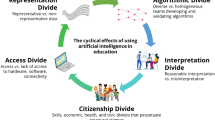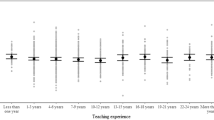Abstract
Research on teacher educators’ professional learning has gained increasing interest within science education. Curriculum materials have been suggested as a means of supporting teacher learning for several decades but have not yet been examined as a potential tool for supporting the learning of teacher educators. In this paper, we conceptualize a set of design heuristics to guide the development of educative curriculum materials for teacher educators. We illustrate how these heuristics guided the identification of specific educative features, which we included when developing prototype educative curriculum materials for elementary science teacher educators in content and/or method courses to support the development of preservice teachers’ content knowledge for teaching about matter and its interactions.







Similar content being viewed by others
References
Abell, S. K. (1997). The professional development of science teacher educators: Is there a missing piece? Electronic Journal of Science Education [On-line], 1(4).
Abell, S. K., Rogers, M. P., Hanuscin, D. L., Lee, M. H., & Gagnon, M. J. (2009). Preparing the next generation of science teacher educators: A model for developing PCK for teaching science teachers. Journal of Science Teacher Education, 20(9), 77–93.
Appleton, K. (2008). Developing science pedagogical content knowledge through mentoring elementary teachers. Journal of Science Teacher Education, 19(6), 523–545.
Arias, A. M., Davis, E. A., Marino, J. C., Kademian, S. M., & Palincsar, A. S. (2016a). Teachers’ use of educative curriculum materials to engage students in science practices. International Journal of Science Education, 38(9), 1504–1526.
Arias, A. M., Bismack, A. S., Davis, E. A., & Palincsar, A. S. (2016b). Interacting with a suite of educative features: Elementary science teachers’ use of educative curriculum materials. Journal of Research in Science Teaching, 53(3), 422–449.
Arias, A. M., Smith, P. S., Davis, E. A., Marino, J. C., & Palincsar, A. S. (2017). Justifying predictions: Connecting use of educative curriculum materials to students’ engagement in science argumentation. Journal of Science Teacher Education, 28(1), 11–35.
Ball, D. L., & Cohen, D. K. (1996). Reform by the book: What is—or might be—the role of curriculum materials in teacher learning and instructional reform? Educational Researcher, 25(9), 6–14.
Ball, D. L., Hill, H. C., & Bass, H. (2005). Knowing mathematics for teaching: Who knows mathematics well enough to teach third grade, and how can we decide? American Educator, 30(3), 14–46.
Ball, D. L., Thames, M. H., & Phelps, G. (2008). Content knowledge for teaching. Journal of Teacher Education, 59(5), 389–407.
Berry, A., & Van Driel, J. H. (2013). Teaching about teaching science: Aims, strategies, and backgrounds of science teacher educators. Journal of Teacher Education, 64(2), 117–128.
Beyer, C. J., & Davis, E. A. (2009). Using educative curriculum materials to support preservice elementary teachers’ curricular planning: A comparison between two different forms of support. Curriculum Inquiry, 39(5), 679–703.
Bismack, A. S., Arias, A. M., Davis, E. A., & Palincsar, A. S. (2015). Examining student work for evidence of teacher uptake of educative curriculum materials. Journal of Research in Science Teaching, 52(6), 816–846.
Brown, M. (2009). The teacher-tool relationship: Theorizing the design and use of curriculum materials. In J. T. Remillard, B. Herbel-Eisenman, & G. Lloyd (Eds.), Mathematics teachers at work: Connecting curriculum materials and classroom instruction (pp. 17–36). Routledge.
Bruner, J. S. (1960). On learning mathematics. The. Mathematics Teacher, 53(8), 610–619.
Brunner, J. L. (2019). Teachers’ use of educative features in guides for nature of science read-alouds. Science & Education, 28(3), 413–437.
Brunner, J. L., & Abd-El-Khalick, F. (2020). Improving nature of science instruction in elementary classes with modified science trade books and educative curriculum materials. Journal of Research in Science Teaching, 57(2), 154–183.
Bullock, S. M. (2009). Learning to think like a teacher educator: Making the substantive and syntactic structures of teaching explicit through self-study. Teachers and Teaching, 15, 291–304.
Bybee, R. W., Taylor, J. A., Gardner, A., Van Scotter, P., Powell, J. C., Westbrook, A., & Landes, N. (2006). The BSCS 5E instructional model: Origins and effectiveness. Colorado Springs, Co: BSCS, 5(88-98).
Cite, S., Lee, E., Menon, D., & Hanuscin, D. (2017). Learning from ‘rookie mistakes’: Critical incidents in developing PCK for teaching teachers. Studying Teacher Education, 13(3), 275–293.
Cochran-Smith, M. (2003). Learning and unlearning: The education of teacher educators. Teaching and Teacher Education, 19(1), 5–28.
Cohen, D. K., & Ball, D. L. (1999). Instruction, capacity, and improvement (Report No. CPRE-RR-43). Office of Educational Research and Improvement (ED), Washington, DC.
Cooper, R., Loughran, J., & Berry, A. (2015). Science teachers’ PCK: Understanding sophisticated practice. In A. Berry, P. Friedrichsen, & J. Loughran (Eds.), Re-examining pedagogical content knowledge in science education (pp. 60-74). Routledge.
Davis, E. A., & Krajcik, J. S. (2005). Designing educative curriculum materials to promote teacher learning. Educational researcher, 34(3), 3–14.
Davis, E. A., Petish, D., & Smithey, J. (2006). Challenges new science teachers face. Review Of Educational Research, 76(4), 607–651.
Davis, E., Palincsar, A. S., Arias, A. M., Bismack, A. S., Marulis, L., & Iwashyna, S. (2014). Designing educative curriculum materials. Harvard Educational Review, 84(1), 24–52.
Davis, E. A., Palincsar, A. S., Smith, P. S., Arias, A. M., & Kademian, S. M. (2017). Educative curriculum materials: Uptake, impact, and implications for research and design. Educational Researcher, 46(6), 293–304.
Dinkelman, T., Margolis, J., & Sikkenga, K. (2006). From teacher to teacher educator: Experiences, expectations, and expatriation. Studying Teacher Education, 2(1), 5–23.
Donna, J. D., & Hick, S. R. (2017). Developing elementary preservice teacher subject matter knowledge through the use of educative science curriculum materials. Journal of Science Teacher Education, 28(1), 92–110.
Donovan, D. A., Rousseau, J., Salter, I., Atkins, L., Acevedo-Gutierrez, A., Kratz, R., Landel, C.C., Mullen, V., & Pape-Lindstrom, P. (2008). Life science and everyday thinking. Activate Learning.
Drake, C., & Sherin, M. G. (2006). Practicing change: Curriculum adaptation and teacher narrative in the context of mathematics education reform. Curriculum Inquiry, 36(2), 153–187.
Goldberg, F., Robinson, S., & Otero, V. (2006). Physics for elementary teachers. It’s About Time.
Goldberg, F., Robinson, S., Otero, V., Kruse, R., & Thompson, N. (2008). Physical science and everyday thinking (2nd ed.). It’s About Time.
Hanuscin, D. Cisterna, D. & Lipsitz, K. (2018). Elementary teachers’ pedagogical content knowledge for teaching the structure and properties of matter. Journal of Science Teacher Education, 29(8), 665–692. https://doi.org/10.1080/1046560X.2018.1488486
Hanuscin, D., Donovan, D., Acevedo-Gutiérrez, A., Borda, E., DeBari, S., Melton, J., Le, T., Morrison, W. & Ronca, R. (2021). Supporting the professional development of science teacher educators through shadowing. International Journal of Science and Mathematics Education, 19(Suppl. 1), S145–S165.
Keeley, P. (2015). Science formative assessment, volume 1: 75 practical strategies for linking assessment, instruction, and learning. Corwin Press.
Land, T. J., Tyminski, A. M., & Drake, C. (2015). Examining pre-service elementary mathematics teachers’ reading of educative curriculum materials. Teaching and Teacher Education, 51, 16–26.
Lloyd, G. (2008). Curriculum use while learning to teach: One student teacher’s appropriation of mathematics curriculum materials. Journal for Research in Mathematics Education, 39(1), 63–94.
Loughran, J. (2013). Developing a pedagogy of teacher education: Understanding teaching & learning about teaching. Routledge.
McDermott, L. C. (1995). Physics by Inquiry: An Introduction to Physics and the Physical Sciences, Volumes 1& 2. John Wiley & Sons.
Mikeska, J. N., Kurzum, C., Steinberg, J., & Xu, J. (2018). Assessing elementary science teachers’ content knowledge for teaching science for the ETS Educator Series: Pilot results (Research Report No. RR-18-20). Educational Testing Service.
Nabors Oláh, L., Howell, H., Lai, Y., & DeLucia, M. (2018, February). Using mini-cases to support pre-service teachers’ Mathematical Knowledge for Teaching. Paper presented at the meeting of the Association of Mathematics Teacher Educators (AMTE), Houston, TX.
National Research Council. (2012). A framework for K12 science education: Practices, crosscutting concepts, and core ideas. Board on Science Education. Washington, DC: National Academies Press.
National Research Council. (2013). Next generation science standards: For states, by states. National Academies Press.
Park Rogers, M., Berry, A., Krainer, K., & Even, R. (2021). Finding common ground: A synthesis of science and mathematics teacher educators’ experiences with professional growth. International Journal Of Science And Mathematics Education, 19(1), 167–180.
Ping, C., Schellings, G., & Beijaard, D. (2018). Teacher educators’ professional learning: A literature review. Teaching and Teacher Education, 75, 93–104.
Pringle, R. M., Mesa, J., & Hayes, L. (2017). Professional development for middle school science teachers: Does an educative curriculum make a difference? Journal of Science Teacher Education, 28(1), 57–72.
Remillard, J. T. (2005). Examining key concepts in research on teachers’ use of mathematics curricula. Review of educational research, 75(2), 211–246.
Schneider, R. M., & Krajcik, J. (2002). Supporting science teacher learning: The role of educative curriculum materials. Journal of Science Teacher Education, 13(3), 221–245.
Shulman, L. S. (1986). Those who understand: Knowledge growth in teaching. Educational Researcher, 15(2), 4–14.
Smith, D. C. (2000). Content and pedagogical content knowledge for elementary science teacher educators: Knowing our students. Journal of Science Teacher Education, 11, 27–46.
Smith, P. S., & Plumley, C. L. (2016). A review of the research literature on teaching about the small particle model of matter to elementary students. Horizon Research, Inc.
Smith, P. S., Plumley, C. L., & Hayes, M. L. (2017). Eliciting elementary teachers’ PCK for the small particle model. Horizon Research, Inc.
Stein, M. K., Remillard, J., & Smith, M. S. (2007). How curriculum influences student learning. Second handbook of research on mathematics teaching and learning, 1(1), 319–370.
Tsaparlis, G., & Sevian, H. (2013). Concepts of matter in science education. Springer.
Wilson, S. M. (2006). Finding a canon and core: Meditations on the preparation of teacher educator-researchers. Journal of teacher education, 57(3), 315–325.
Windschitl, M., Thompson, J., Braaten, M., & Stroupe, D. (2012). Proposing a core set of instructional practices and tools for teachers of science. Science Education, 96(5), 878–903.
Wood, D., & Borg, T. (2010). The Rocky Road: The journey from classroom teacher to teacher educator. Studying Teacher Education, 6, 17–28.
Funding
This material is based upon work supported by the National Science Foundation under grants DRL-1814275 and DRL-1813254.
Author information
Authors and Affiliations
Corresponding author
Ethics declarations
Ethical Approval
The study was reviewed and deemed exempt by the Western Washington University (WWU) Institutional Review Board (Study #4360EX21).
Disclaimer
Any opinions, findings, and conclusions or recommendations expressed in this material are those of the authors and do not necessarily reflect the views of the National Science Foundation.
Rights and permissions
Springer Nature or its licensor (e.g. a society or other partner) holds exclusive rights to this article under a publishing agreement with the author(s) or other rightsholder(s); author self-archiving of the accepted manuscript version of this article is solely governed by the terms of such publishing agreement and applicable law.
About this article
Cite this article
Hanuscin, D., Borda, E., Melton, J. et al. Designing Educative Curriculum Materials for Teacher Educators: Supporting Preservice Elementary Teachers’ Content Knowledge for Teaching About Matter and Its Interactions. Int J of Sci and Math Educ (2024). https://doi.org/10.1007/s10763-024-10453-7
Received:
Accepted:
Published:
DOI: https://doi.org/10.1007/s10763-024-10453-7




